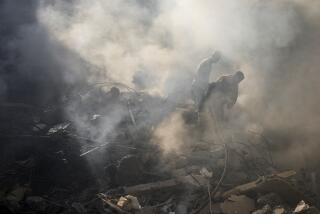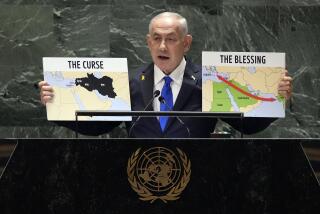Balkan Warlords’ Defiance Frustrates U.N. Mission : Yugoslavia: Belligerents demand that peacekeepers move out of hotels and pay taxes on road use.
- Share via
BELGRADE, Yugoslavia — Balkan warlords have stonewalled one of the largest U.N. peacekeeping efforts in history, and the world organization’s troops are being maimed in record numbers because they are deployed “with both hands tied behind their backs,” mission commander Gen. Satish Nambiar complained Friday.
Affronts to the U.N. mission include a demand made this week by Serbian gunmen in eastern Croatia for the peacekeepers to pay “road-use taxes” if they want to patrol Serb-held areas. The soldiers have also been ordered to move out of their hotel rooms and barracks, and their bases have been threatened with a cutoff of water and electricity.
In Bosnia-Herzegovina, where only Serbian forces have aircraft, there have been more than 100 violations of a U.N. “no-fly” order in the last month, and the rebels continue to block deployment of a Canadian contingent into the tense area around Banja Luka.
In just the last two days, an airborne plane carrying the U.N. mission’s deputy commander took eight bullets in its fuselage, a Danish soldier was kidnaped in a Croat-held area of Bosnia, Serbian civilians halted another aid convoy en route to the besieged Muslim city of Srebrenica and U.N. observers recorded 1,304 rounds of artillery fired at monitored positions in Sarajevo in a 24-hour period.
Of the shells fired in violation of several cease-fires and U.N.-brokered agreements, 1,284 were lobbed at Bosnian government positions, presumably by rebel Serbs, and 20 were targeted at Serbian units, presumably by Muslim-led government forces, U.N. sources said.
“The developments of the last few days have caused doubts among even the most optimistic of my colleagues about the parties’ seriousness in seeking resolution of the conflict in this region,” Nambiar told reporters in an unusually frank news conference.
Nambiar declined to say what recommendations he has made to the U.N. headquarters in New York to salvage the effort to bring peace to the shattered Balkans. But he exuded frustration, and at times emotion, while airing the stunning list of obstacles the warring factions have thrown in his path.
The Indian general described as “deliberate” the Thursday attack on a U.N. plane carrying Maj. Gen. Philippe Morillon of France and said he was suspending all further humanitarian relief flights into Sarajevo “until we are able to find some kind of credible assurances that our aircraft will not be targeted.”
Nambiar became emotional when discussing the 310 injuries--20 of them fatal--inflicted on his troops in the eight months they have been deployed in conflict regions of the former Yugoslav republics.
“These young boys are here without the normal tools of warfare because they are here to keep peace,” he said, hinting at disagreement with the mandate that limits defense options for U.N. soldiers. “They are doing this with both hands tied behind their backs, so they are the ones suffering (casualties). It is very depressing.”
Croats have been expressing anger and impatience with the U.N. peacekeeping effort for months, complaining that the troops’ unwillingness to challenge Serbian rebels flouting U.N. authority has effectively conceded victory to the aggressors. Bosnian Muslims also hold the U.N. mission in general contempt for failing to deter the brutal, continuing Serbian land-grab that has flushed 2 million people from their homes and killed tens of thousands, mostly Muslim civilians.
Although Nambiar avoided mentioning which of the factions was responsible for each of the peacekeeping obstacles he listed, the vast majority occurred in Serb-held areas of Croatia, where local warlords have united and declared their own state, the Republic of Serbian Krajina.
Goran Hadzic, who claims to be Krajina’s president, informed the United Nations by letter Thursday that his rebel republic was not a party to the peacekeeping plan drafted by U.N. envoy Cyrus R. Vance and, therefore, was under no obligation to conform to its call for disarmament and restoration of civilian rule.
Nambiar repeatedly criticized the warring factions for signing agreements and making promises during negotiations that they had no intention of keeping. “We have yet to see any genuineness among the parties,” he said. “Each side is trying to interpret the (peace) plan to its own advantage. In any conflict situation, that cannot work.”
Despite the severe setbacks encountered by the U.N. troops, who now number more than 23,000 in Croatia and Bosnia, Nambiar said he would not advocate withdrawal of the peacekeeping force. “This is not an option we have suggested,” he said. “This is not an answer to the problems of this region. If anything, it would cause a renewal of the conflict.”
Fighting in the Serb-held areas of Croatia has mostly died down since the U.N. troops arrived in April to quell violence that took 10,000 lives in the republic last year. But the Croatian leadership has become increasingly dismayed by the U.N.-secured status quo, which maintains relative peace by allowing the rebel Serbs to retain exclusive control over Croatian land they have conquered.
Croatian President Franjo Tudjman has threatened to veto an extension of the U.N. mandate when it expires in March, unless foreign troops fulfill their objective of making the deployment areas safe enough for the return of more than 200,000 non-Serbian refugees expelled from their homes by the Serbian practice of “ethnic cleansing.”
More to Read
Sign up for Essential California
The most important California stories and recommendations in your inbox every morning.
You may occasionally receive promotional content from the Los Angeles Times.














